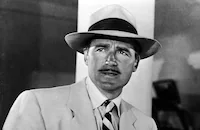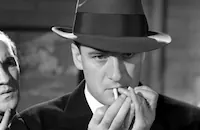The Spellbinder

Brief Synopsis
Cast & Crew
Jack Hively
Lee Tracy
Barbara Read
Patric Knowles
Allan Lane
Linda Hayes
Film Details
Technical Specs

Synopsis
Jed Marlow, a wily lawyer adept at devising tricks to win unjust acquittals for his criminal clients, faces a dilemma when client Tom Dixon informs him that he plans to murder the auditor who has been blackmailing him and threatens Marlow himself with blackmail unless the lawyer agrees to defend him. Over Marlow's objections, Dixon proceeds with his plan, and after making it look as if the auditor was drunk, Dixon pushes him down the stairs to his death. Newspaper reporter Steve Kendall, however, suspects that the accidental death was murder, and his accusations bring Dixon to trial. In a brilliant courtroom tactic, Marlow incites the judge into sentencing him to jail for contempt of court, thus winning the jury's sympathy and his client's acquittal. To insure that his lawyer's lips will remain sealed, Dixon elopes with Marlow's innocent young daughter Janet. Enraged when he learns of his daughter's marriage, Marlow slays Dixon on his wedding night. Brought to trial for murder, Marlow refuses to testify in his defense to protect Janet. When Janet learns the truth about Dixon, however, she rushes to court to defend her father. To spare his daughter embarrassment, Marlow confesses the extenuating circumstances that drove him to commit murder, and an understanding judge promises to temper justice with leniency.

Director
Jack Hively
Cast

Lee Tracy
Barbara Read

Patric Knowles
Allan Lane

Linda Hayes
Morgan Conway
Robert Emmett Keane

Roy Gordon
Robert Strange

Elliott Sullivan

Leonid Kinskey
Crew
Joseph Anthony
Albert D'agostino
Rex Dunn
Joseph A. Fields
Thomas Lennon
Lee Marcus
Russell Metty
Van Nest Polglase
Cliff Reid
Renie
John E. Tribby
Theron Warth

Film Details
Technical Specs

Articles
The Spellbinder
Jed Marlowe is a classic Tracy role, a silver-tongued lawyer who befuddles witnesses on the stand and manipulates juries with theatrics, but apart from the shenanigans behind the scenes of the first trial (he pays off a small company of actors to play his client's family in court) there's no comic twist here. He's a cynic when it comes to law but a doting, protective single father when it comes to his teenage daughter Janet (Barbara Read). She adores him and plays hooky from finishing school to watch him defend his client Tom Dixon (Patric Knowles) for murder. Knowles was a handsome British import whose poise and confidence landed him a few leading roles but mostly was relegated to supporting parts. He played drama, comedy, and adventure with equal success. For The Spellbinder he played another of his specialties: the charming cad.
Bubbly and spirited Barbara Read made her film debut playing Deanna Durbin's sister in Three Smart Girls (1936) but soon slipped into B-movies and never really broke back out. She did, however, take over the role of Margot Lane in a trio of films opposite Kane Richmond as Lamont Cranston, aka The Shadow, starting in 1946. Allan Lane, who plays the dogged but principled crime reporter Steve Kendall, went on to become a B-movie cowboy star, playing Red Ryder (taking over from Bill Elliott) and Rocky Lane in dozens of matinee westerns through the 1940s and 1950s, and ended his career as the voice of the talking horse in the sitcom Mr. Ed.
And if you recognize Leonid Kinskey, who plays the saxophone player who hauls his horn up with him to the witness stand, it could be from any number of roles - he was a prolific character actor, usually playing witty foreigners or immigrants in dozens of films through the thirties and forties - but it's probably because of a small but memorable part he had in one of the most iconic Hollywood films ever made: he's Sascha the good-natured bartender in Casablanca (1942).
"Mr. Tracy is a show by himself," wrote the unnamed film critic in the brief New York Times notice, while the Motion Picture Daily reporter identified only as G. McG wrote: "Sophisticated audiences may view The Spellbinder as an attraction they can get along with or without; yet there's sufficient melodrama, comedy, suspense and human interest in it to hold attention of rank and file patronage."
By Sean Axmaker
Sources:
"The Spellbinder film review," The New York Times, August 24, 1939.
"The Spellbinder film review," G. McG. The Motion Picture Daily, Tuesday, July 25, 1939.
IMDb














